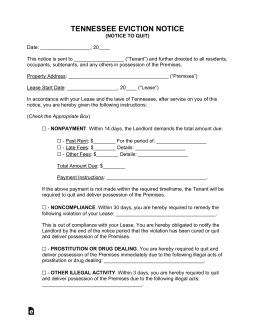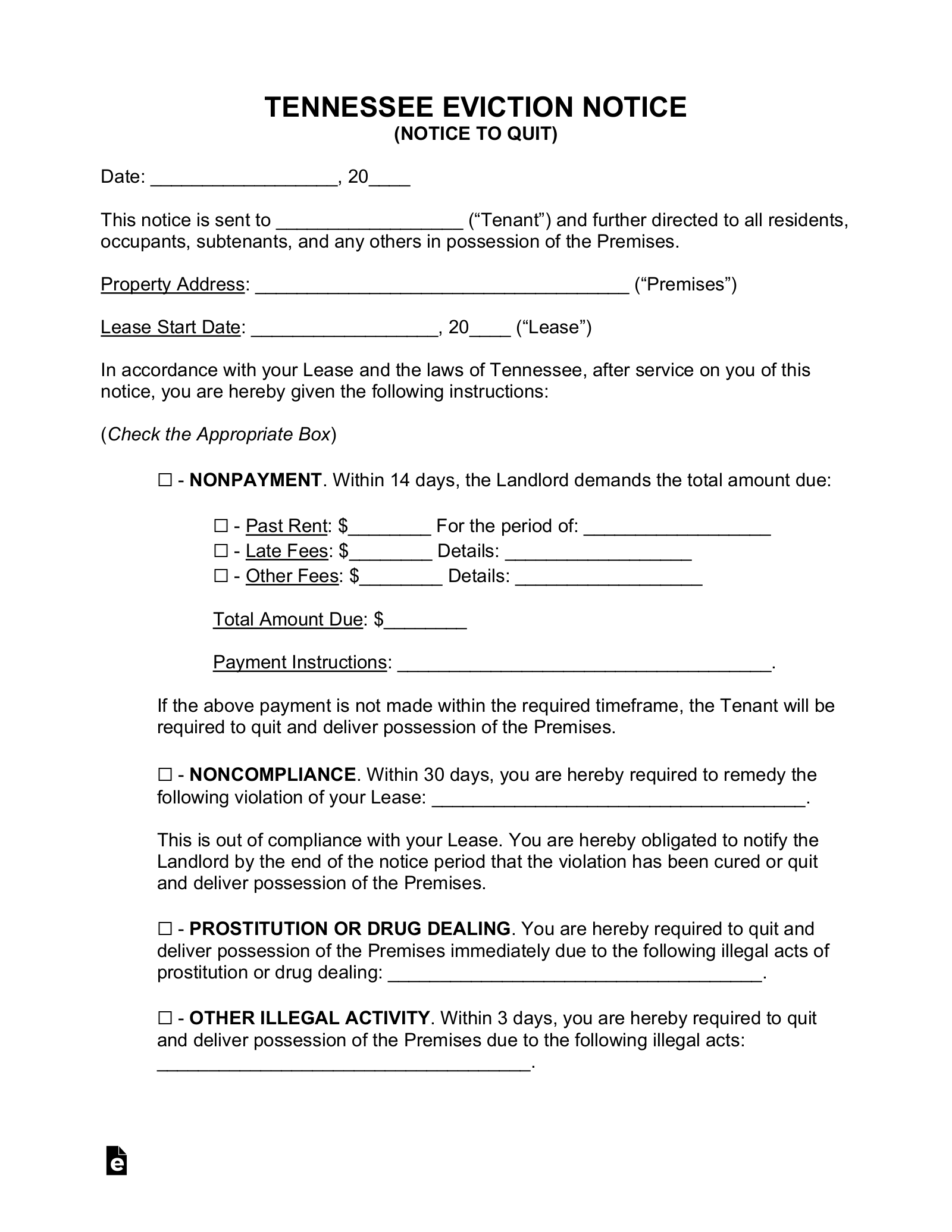Updated April 03, 2024
A Tennessee eviction notice is given by a landlord to a tenant to provide notice of a lease violation. The landlord must describe the offense and enter the time period for which the tenant must comply with the demands. If the tenant resolves the matter, the lease will continue as if the issue never occurred. Otherwise, the landlord can file an eviction lawsuit (Forcible Entry and Detainer) at the General Sessions Court.
By Type (5)
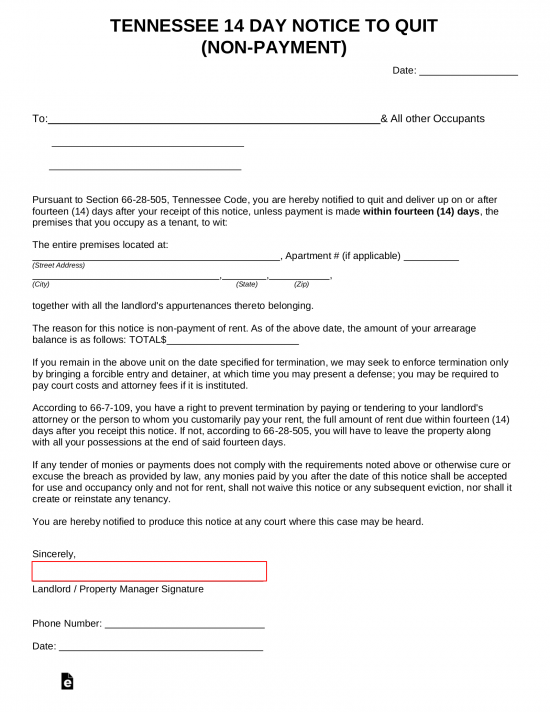 14-Day Notice to Quit (Non-Payment of Rent) – Used when a tenant fails to pay rent on time. A landlord must give the tenant 14 days to pay. 14-Day Notice to Quit (Non-Payment of Rent) – Used when a tenant fails to pay rent on time. A landlord must give the tenant 14 days to pay.
Download: PDF, MS Word, OpenDocument |
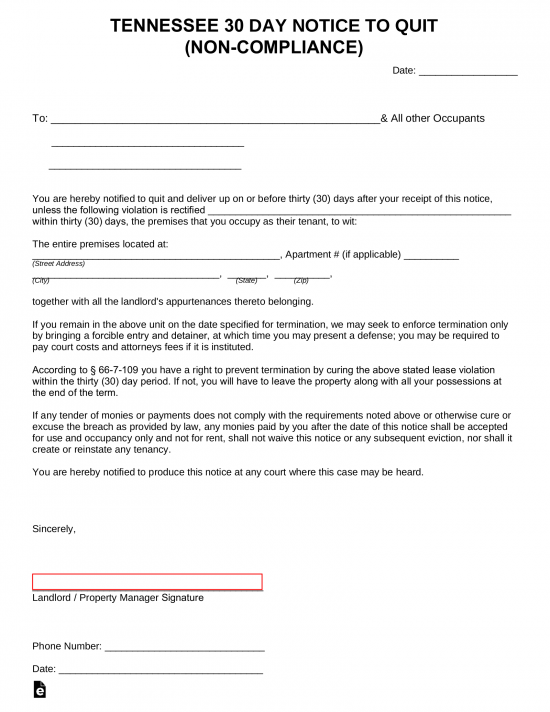 30-Day Notice to Quit (Non-Compliance) – Used when there is a breach of the lease other than for damage or non-payment of rent. The tenant has 30 days to vacate before the landlord may seek eviction. 30-Day Notice to Quit (Non-Compliance) – Used when there is a breach of the lease other than for damage or non-payment of rent. The tenant has 30 days to vacate before the landlord may seek eviction.
Download: PDF |
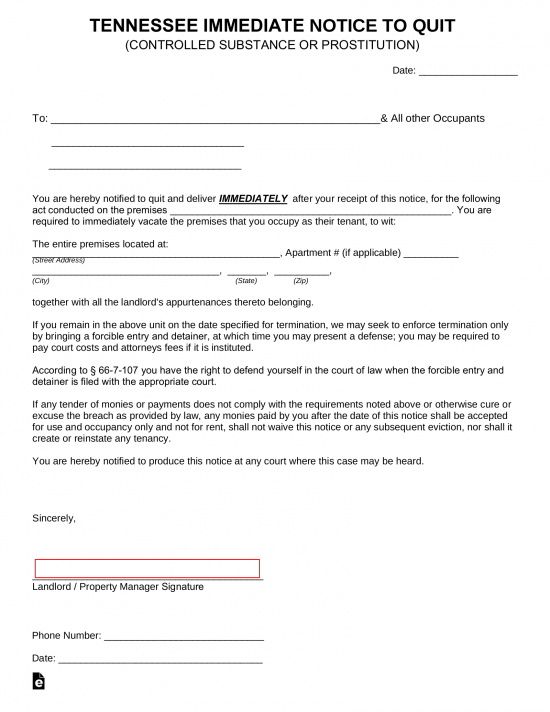 Immediate Notice to Quit (Prostitution or Drug Violations) – Used when a tenant is engaged in certain kinds of illegal behavior for which the landlord can have them removed immediately. Immediate Notice to Quit (Prostitution or Drug Violations) – Used when a tenant is engaged in certain kinds of illegal behavior for which the landlord can have them removed immediately.
Download: PDF |
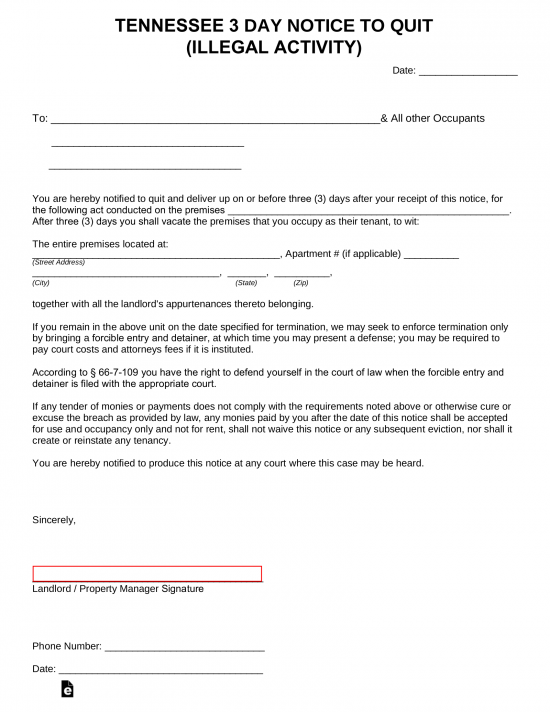 3-Day Notice to Quit (Illegal Behavior) – Used for any other kind of illegal behavior that is an immediate threat. The tenant cannot cure this type of behavior and will have to vacate within 3 days. 3-Day Notice to Quit (Illegal Behavior) – Used for any other kind of illegal behavior that is an immediate threat. The tenant cannot cure this type of behavior and will have to vacate within 3 days.
Download: PDF |
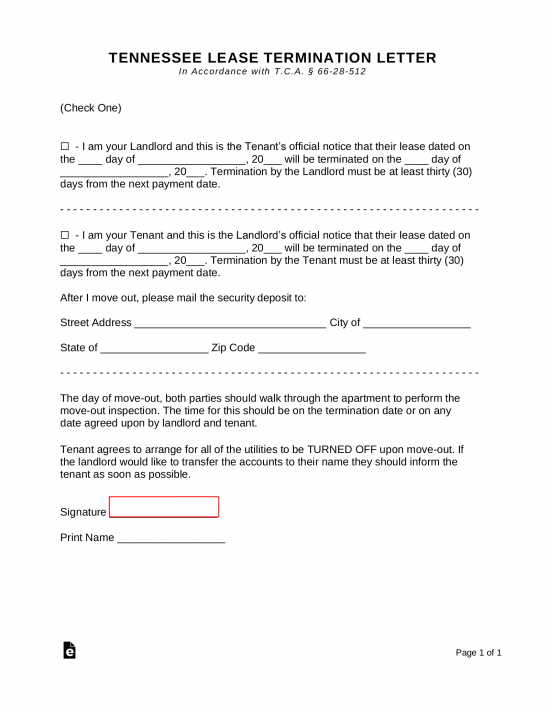 30-Day Notice to Quit (Month-to-Month Tenancy) – Used when a party seeks to inform the other party that they do not intend to renew a month-to-month tenancy. 30-Day Notice to Quit (Month-to-Month Tenancy) – Used when a party seeks to inform the other party that they do not intend to renew a month-to-month tenancy.
Download: PDF, MS Word, OpenDocument |
Table of Contents |
Eviction Laws
- Rent Grace Period: 5 days to be eligible for charging late fees.[1]
- Non-Payment of Rent: 14 days.[2][3]
- Non-Compliance: 30 days.[4]
- Illegal Behavior: 3 days.[5]
- Prostitution or Drug Violations: Immediate.[6]
- Termination (Month-to-Month Lease): 30 days.[7]
- Eviction Lawsuit: Forcible entry and detainer.[8]
Prohibited Landlord Actions
Utility Shutoff – If a landlord willfully interrupts essential services to the tenant, the tenant may recover possession or terminate the rental agreement and recover damages as well as attorney’s fees from the landlord.[9]
Changing the Locks – If a landlord unlawfully removes or excludes a tenant from the premises, the tenant may recover possession or terminate and rental agreement and recover damages as well as attorney’s fees from the landlord.[9]
Court Form
Detainer Summons – Used by landlords when a tenant fails to vacate a rental unit and an eviction is needed to remove the individual from the premises.
Writ of Possession – Issued by the court after a landlord prevails in an eviction lawsuit. This document proves that the landlord is entitled to reclaim possession of the rental unit.
How to Evict a Tenant (4 steps)
- Provide Notice to Tenant
- File Summons with Local Court
- Serve Detainer Warrant on Tenant
- Attend Court Hearing
1. Provide Notice to Tenant
Before beginning an eviction process in court, a landlord must notify the tenant in writing about a breach. Depending on the breach, the tenant may have 14 days or 30 days to cure. Other breaches are not curable, and the tenant must be out of the premises on the date specified. The types of notices are as follows:
2. File Summons with Local Court
If the tenant does not respond satisfactorily to the notices, the landlord may file a Detainer Summons with the local General Sessions Court. The General Sessions Court must have jurisdiction over the location of the rented premises. The court will set a hearing date.
Filing fees vary by local jurisdiction.
4. Attend Court Hearing
The hearing will be at least six days from the date that the tenant was served. If the tenant fails to appear or the landlord proves their case, the court will issue a Writ of Possession, which will entitle the landlord to possession of the premises. This authorizes the sheriff to remove the tenant if they fail to vacate.
Sources
- § 66-28-201(d)
- § 66-28-505(a)(2)
- § 66-7-109
- § 66-7-109(b)
- § 66-28-517
- § 66-7-107(a)
- § 66-28-512(b)
- Title 29, Chapter 18 (Forcible Entry and Detainer)
- § 66-28-504
- Shelby County: Court Costs
- Nashville Circuit Court: General Sessions Civil Filing Fees
- Knox County General Sessions Court – Civil Division

